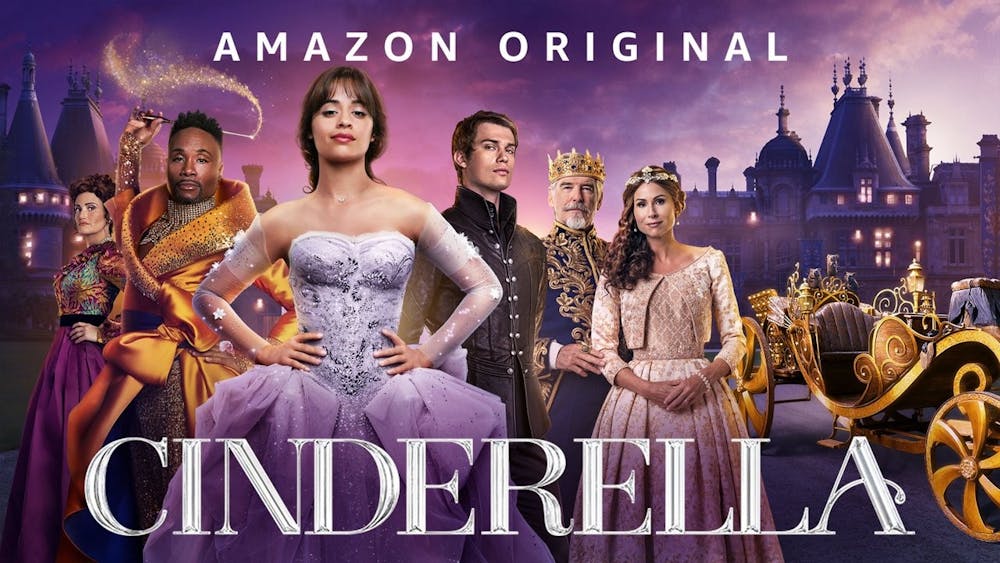Movie: “Cinderella”
Director: Kay Cannon
Starring: Camila Cabello, Nicholas Galitzine, Idina Menzel
Studio: Amazon Studios
Rating: 3.5/10
Once upon a time, Hollywood found its own glass slipper with the fairytale, “Cinderella,” which spawned a trove of beloved movies like Disney’s 1950 animated feature of the same name and Hilary Duff’s teen rom-com “A Cinderella Story.”
However, “Cinderella” (2021) will not be joining said trove.
The jukebox musical, directed and written by Kay Cannon, attempts to modernize the classic tale with a feminist-spin by focusing on Cinderella, played by Camila Cabello, and her dreams of becoming a famous dressmaker. Aside from that, the movie follows quintessential Cinderella plot points, including an evil stepmother (played by Idina Menzel) attending a royal ball with the help of a fairy godmother (in this case the Fabulous Godmother, played by Billy Porter) and falling in love with “Prince Charming” (played by Nicholas Galitzine as Prince Robert).
Despite trying to make Cinderella into a modern day “#girlboss,” Cannon betrays the narrative that hard work is the force behind success by creating a plot in which Cinderella achieves her dreams through circumstance, rather than pure dedication.
It’s not Cinderella’s talent or skill that gets her discovered, rather the Prince’s infatuation with her which drives him to support her business endeavors and invite her to the royal ball.
The royal ball proves a crucial point in Cinderella’s career trajectory, where Queen Tatiana, played by Beverly Knight, inquires about the dress Cinderella wears and offers her the opportunity to become her personal dressmaker. Though the dress was designed by Cinderella, it was actually made by the Fabulous Godmother through magic, not thread and needle.
Cinderella’s unearned reward only serves to demonstrate the flimsy nature of Cannon’s grasp on feminist storytelling, giving the film a flat and unthoughtful feel.
The movie does attempt to extoll viewers on the importance of “choosing me,” i.e. prioritizing oneself and one’s own ambitions. Yet, there is very little at stake for the protagonists in making this choice, with only the one-day romance between Cinderella and Prince Robert hanging in the balance. This makes the message feel overly juvenile, even for a family-friendly audience.
The storytelling is only further weakened by a lukewarm antagonist, the evil stepmother, who Cannon attempts to redeem through a tragic backstory (“tragic” being used loosely). However, that is all Cannon provides by way of redemption, rather than any remorse or repentance for the stepmother’s abuse and neglect toward Cinderella.
Neither is the poor storytelling helped by the film’s abysmal acting. Camila Cabello’s amateur approach to cinema stands out like a sore thumb, especially against more seasoned actors like Tony Award winner Menzel.
Not just failing in its rhetoric, “Cinderella” also fails as a musical.
The music numbers, featuring pop hits such as “Perfect” by Ed Sheeran and “Material Girl” by Madonna, serve better as imaginative music videos than plot-driving devices. Rather than advance the storytelling, these songs simply extend the run time, which, at nearly two hours, proves exhausting halfway through.
As for visuals, “Cinderella” rivals the camp-themed 2019 Met Gala in over-the-topness and swaths of eye-catching color. If nothing else, the film provides the audience with enough funky hairstyles and billowing ball gowns to keep audiences entertained.
But whatever fun is found in the films’ costuming is quickly undermined by poor CGI and awkward staging. The worst offenders of this are easily the three CGI mice that look more suited for a 2009 film, and the “Million to One (Reprise)” scene that turns a would-be emotional and inspirational solo into a clumsy and trite delivery.
Overall, “Cinderella” proves to be a shallow and unnecessary rendition of a classic fairytale. Rather than provide viewers with a strong female protagonist and a fresh take on the story, “Cinderella” serves only to waste two hours with weak and contradictory feminist rhetoric while serving up reiterations of top radio hits from the past three decades.
Although not the worst film to grace the silver screen, “Cinderella” far more resembles the pumpkin before the carriage in this adaptation.
Kara Anderson is the assistant arts editor and can be reached at kara.anderson@ubspectrum.com

Kara Anderson is a senior arts editor at The Spectrum. She is an English and Spanish double major and is pursuing a certificate in creative writing. She enjoys baking chocolate chip cookies, procrastinating with solitaire and binging reality TV on the weekends.





